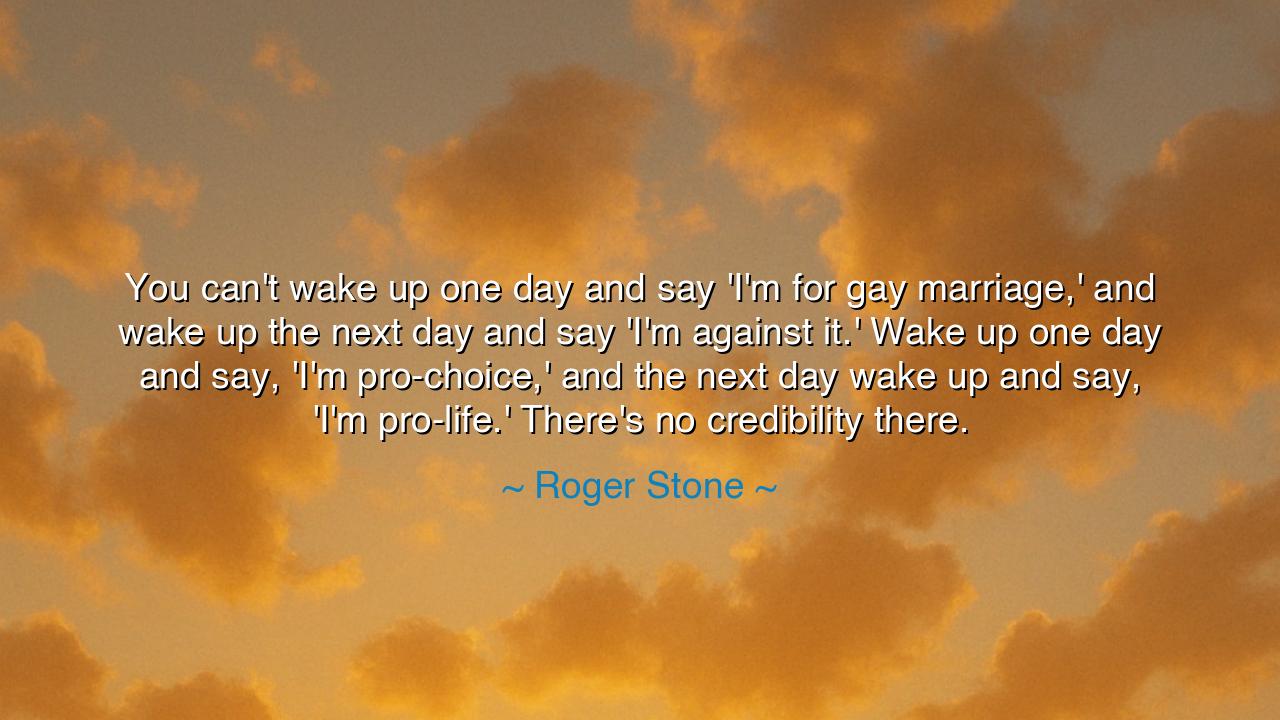
You can't wake up one day and say 'I'm for gay marriage,' and
You can't wake up one day and say 'I'm for gay marriage,' and wake up the next day and say 'I'm against it.' Wake up one day and say, 'I'm pro-choice,' and the next day wake up and say, 'I'm pro-life.' There's no credibility there.






In the words of Roger Stone, “You can’t wake up one day and say ‘I’m for gay marriage,’ and wake up the next day and say ‘I’m against it.’ Wake up one day and say, ‘I’m pro-choice,’ and the next day wake up and say, ‘I’m pro-life.’ There’s no credibility there.” These words are not only a critique of politics but a warning to all who would lead, speak, or act in the world. They remind us that conviction must be steady, that one’s word must be as firm as stone, else it crumbles into dust. To change belief with the ease of a shifting breeze is to lose honor, for the people see not strength in such wavering, but weakness and deceit.
The ancients held fast to this principle. They taught that a man’s word was his bond, and that to speak falsely or inconsistently was to dishonor both self and society. In Rome, a senator who swayed too easily with the winds of power was called a weathercock, turning whichever way the storm blew. Such men were despised, for they could not be trusted in matters of state or war. Stone’s words echo this ancient wisdom: that credibility is the foundation of leadership, and without it, no law, no decree, no policy can stand.
History gives us clear examples. Consider Marcus Aurelius, emperor and philosopher, who endured wars, plagues, and rebellion. Through all, he remained steadfast in his Stoic convictions, never abandoning the principle that reason and duty must guide the ruler. His people followed him not because fortune was always kind, but because they trusted his constancy. Contrast this with leaders who shifted with every pressure—who promised one thing to the people and another to the powerful. Such figures are remembered not for greatness, but for hypocrisy and ruin.
Stone’s mention of gay marriage and the conflict between pro-choice and pro-life reveals the battlegrounds of modern society, where issues of identity, morality, and freedom burn with passion. To shift positions casually on such matters is not only political weakness, but betrayal of those whose lives depend upon consistency. The people do not demand that every leader agree with them, but they do demand clarity: let your yes be yes, and your no be no. Anything else, as the scriptures say, comes from falsehood.
The deeper lesson is that convictions are not garments to be changed with fashion, but roots that anchor us in storm. To lack such roots is to drift endlessly, unable to guide oneself, much less others. A leader who changes beliefs with convenience shows not open-mindedness, but opportunism. True open-mindedness allows growth, yes, but growth is measured, reasoned, and explained. Sudden reversals, made without principle, destroy trust. And trust once lost is almost impossible to regain.
Therefore, the teaching is clear: if you would have credibility, stand firm in your beliefs, and if you must change them, do so openly, with humility and explanation. Let not ambition dictate your truth, but let truth dictate your path. Remember that a single steady word spoken over years builds more trust than a thousand shifting promises. In the eyes of the people, constancy is strength, while inconsistency is betrayal.
Practical steps follow from this wisdom. Examine your beliefs carefully before declaring them, for once spoken, they become the measure of your integrity. Stand firm under pressure, for storms reveal the depth of roots. If you must change, explain with honesty, showing how time, learning, and experience guided you, not convenience or fear. And above all, be mindful that credibility is a treasure—easily lost, seldom regained, and more valuable than gold.
Thus, Roger Stone’s words remind us of an eternal truth: that a leader’s greatness is not measured by eloquence, wealth, or power, but by the steadiness of conviction. To change with every dawn is to be forgotten; to stand firm through the ages is to be remembered. Let us therefore live and speak with such integrity, that our words, like carved inscriptions, endure beyond our days.






AAdministratorAdministrator
Welcome, honored guests. Please leave a comment, we will respond soon